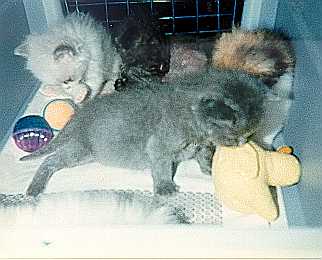



These kitten pictures were donated by Sue
Unfortunately, sometimes very young kittens are left motherless. Perhaps the mother dies, or is taken in by a well meaning person that doesnít realize she still has a litter of kittens somewhere. Or, an irresponsible pet owner abandons them simply because they do not want to deal with the consequences of not getting their cat spayed.
These kittens are very vulnerable and need very specific care. If you have found an abandoned kitten, please consult a veterinarian immediately. This page is intended to give information on how to care for your kitten until you are able to do this. When caring for abandoned kittens, you must take the place of the mother cat. You must clean the kittens, keep them warm, feed them and stimulate elimination. What you will need: You will need nursing bottles designed for kittens, Kitten milk replacement, and a flea comb, all of which are available at most pet supply stores or feed stores.
You will also need a heating pad, washcloth, cotton balls, and you may also want thick rubber gloves to prevent your hands from being clawed, as kittens naturally knead when fed.
Feeding your kitten: Sterilize the bottle. In most cases, it is OK to place the empty bottle in a pan of boiling water for about twenty minutes. Make a hole in the nipple with a sterile needle. Check the size of the hole by holding the bottle upside down with liquid in it. The liquid should steadily drip out of the bottle without any pressure. if it comes out in a stream, the hole is too large.. If it does not drip, the hole is too small. The milk replacement should be room temperature. You may want to wear gloves in feeding your kitten, or otherwise protect your hands and clothing. Kittens knead by nature and can do quite a bit of damage in a single feeding if you are not careful. Touch the bottle to the kittenís lip and allow them to latch on and suckle. Do not attempt to force feed, allow the kitten to stop when he/she has had enough. A healthy kitten will take approximately 8 cc of formula per ounce of body weight per day. If the kitten takes any less than this, veterinary assistance is needed. A one week old kitten needs to be fed every 2-3 hours. Set your alarm clock at night. Itís no fun, I know, but it is necessary. By 2 weeks, they should be down to 4-6 hours between feedings. If youíre feeding multiple kittens, pay very close attention to their skin. Young kittens will often suckle anything thatís available, including each other. If they are injuring each otherís skin in any way, separate them, as this poses a risk of mutilation.
After the kitten stops nursing, he/she will need to be burped. This can be accomplished by placing the kitten against your shoulder, much like a human baby, and pat your kitten very gently on the back.
The kitten also needs to be stimulated to eliminate. Use a damp cotton ball and gently stroke the kittenís urethra and rectum. They should urinate and possibly defecate. TA healthy kitten should defecate at least once per day.
Kittens also need to be cleaned and kept free of fleas. Very young kittens can be cleaned with a damp washcloth or cotton ball. Use a comb to remove any fleas. Fleas can make a very young kitten become anemic quickly. Older kittens can be bathed in a sink or small tub.
What NOT to do:
Do NOT allow a kitten under three weeks to get cold. They cannot regulate their body
temperature.
Do not feed them cows milk. They will suffer and possibly die from malnutrition, and
they may also suffer from constipation or diarrhea if cows milk is used.
Do not attempt to force milk down their throats with an eyedropper or syringe. This can
result in many problems, one of which being that they can aspirate the fluids. If your
kitten does not latch on to the bottle and suckle, take it to a vet immediately.
Do not keep the kitten with other adult cats, dogs, small children or babies. A tiny kitten
can be fatally injured with a single motion. Also keep in mind you should not allow your kitten around any other cats you may have until he or she has been vet checked to be certain that he or she doesn't have a contagious disease.
Most kittens can be safely weaned by 8 weeks of age. Check with your veternarian to be sure.
If you do not plan on keeping your kitten when he or she is weaned, please do not give
him/her away for free. Free to good home kittens are at high risk for abuse and neglect.
Please read Finding a Home for
stray for tips on finding a suitable home for your kitten.

Kitten picture donated by Sue
Links
Kitten Fostering and Ownership Handbook
Handraising Orphaned Kittens